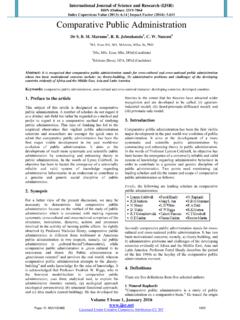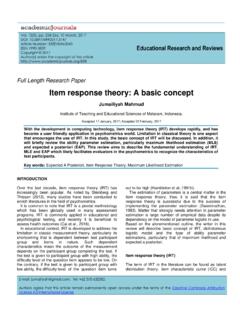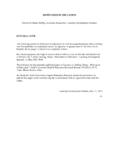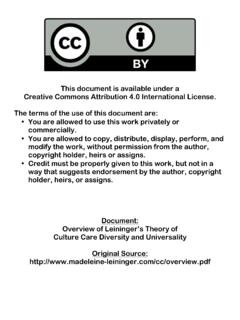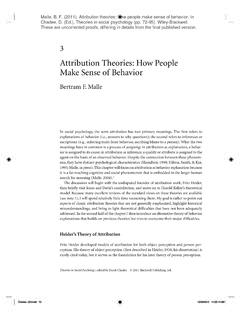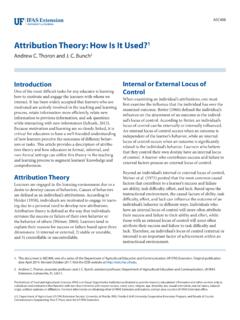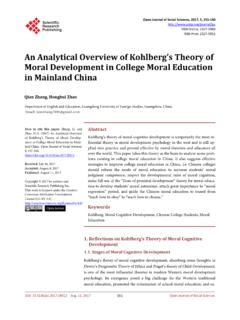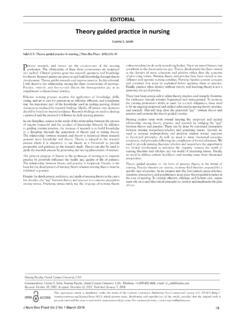Transcription of The Theory of Planned Behavior and Parental Involvement: A ...
1 International Journal of Science and Research (IJSR) ISSN (Online): 2319-7064 Index Copernicus Value (2013): | Impact Factor (2015): Volume 5 Issue 4, April 2016 Under Creative Commons attribution CC BYThe Theory of Planned Behavior and Parental Involvement: A Theoretical Framework for Narrowing the Achievement Gaps Yazan Alghazo, of Humanities and Social Sciences, Prince Mohammad Bin Fahd University, Alkhobar, Kingdom of Saudi Arabia Abstract:This theoretical paper presents a theoretical model that shows the effect of cultural aspects mentioned in the Theory of Planned Behavior , namely, subject norms on Parental involvement behaviors of parents.
2 The paper reports on the findings of several studies that demonstrate the relationship between Parental involvement and student achievement in school in several cultural contexts. The findings and conclusions of this theoretical paper suggest that emphasis needs to be placed on increasing Parental involvement in children s education as a tool to decrease achievement gaps between students. More specifically, Parental involvement can be seen as a tool to overcome achievement gaps caused by socioeconomic differences between students families. Keywords: Parental Involvement, Achievement Gaps, Theory of Planned Behavior .
3 1. Theory of Planned Behavior Ajzen s (1991) Theory of Planned Behavior is a Theory designed to predict and explain human Behavior in specific contexts ( ). The Theory focuses on the motivational reasons that lead to higher intentions to perform a Behavior on the basis that the stronger the intention to engage in a Behavior , the more likely should be its performance (Ajzen, 1991, ). According to the Theory of Planned Behavior , one should understand the reasons that lead to intentions in order to be able to predict future involvement in a Behavior .
4 Figure 1: Theory of Planned Behavior . The Theory of Planned Behavior (TPB) sets a model for humans actions in which intentional Behavior is determined by: (a) attitudes and behaviors, (b) subjective norms, and (c) perceived controls (see Figure 1.). Attitudes and behaviors include feelings and attitudes towards a certain Behavior . Believing that a certain Behavior has positive outcomes will surely lead to more intention to perform that Behavior . Subjective norms are the opinions of the people surrounding the person wishing to engage in a certain Behavior , which can lead to peer pressure and social pressure, both of which can lead to one s higher intentions to perform a certain Behavior .
5 Finally, perceived control is one s own perception of his/her ability to perform a certain Behavior ; perceivedcontrol contributes to both having the intention to perform certain behaviors as well as whether or not the person would actually perform the Behavior (Ajzen, 1991). The Theory of Planned Behavior can be used to explain and predict the Behavior of Parental involvement in children s schooling. Perry and Langley (2013) suggest using Ajzen s Planned Behavior Theory ; they argue that the Theory of Planned Behavior is versatile enough to account for the dynamicand complex nature of paternal engagement (p.)
6 181). Furthermore, according to Bracke and Corts (2012), parents culture, having examples of Parental involvement, and having role models or neighbors that do or do not get involved in their children s education are all factors that help shape the subjective norms about the role of parents in education (p. 194). 2. Theoretical Models of Parental Involvement Hoover-Dempsey and Sandler (1995) provided a theoretical definition for researching Parental involvement. Their theoretical model defines Parental involvement according to three main points: (1) why parents become involved in their children s education,(2) how parents choose specific types of involvement, and (3) why Parental involvement has a positive influence on students educational outcomes.
7 According to Fan and Chen (2001), this theoretical framework promises to be more than a typology for Parental involvement, because it not only deals with specific types of Parental involvement, but more importantly, it attempts to explain why parents choose to be involved, and what the mechanisms are through which Parental involvement exert[s] positive influence on students educational outcomes. ( ) Epstein and Dauber (1991) proposed a model that distinguishes six different types of parent-school connections: First, Basic obligations of families ( ) which refers to the parents role in raising their children and preparing for their school years by providing a suitable home environment and conditions that foster their children s growth and development throughout their school years.
8 Second, Basic obligations of schools ( ) which refers to the role of schools in communicating with the parents about the academic progress of their children and providing constant feedback to parents about their children s schooling and development. Third, Involvement at school ( ) which refers to parents visits and volunteer work at the school to help support their children with both academic and Paper ID: NOV162664570 International Journal of Science and Research (IJSR) ISSN (Online): 2319-7064 Index Copernicus Value (2013): | Impact Factor (2015): Volume 5 Issue 4, April 2016 Under Creative Commons attribution CC BYextracurricular activities.
9 Epstein and Dauber (1991) suggest that schools can improve this type of involvement by offering flexible schedules that allow more families to be involved. Fourth, Involvement in learning activities at home ( ) which includes parents being involved in their children s homework and learning activities through the guidance of a school s teachers; this promotes collaboration between the teachers and parents allowing them both to keep track of children s development and academic growth. Fifth, Involvement in decision-making ( ), which refers to active participation in parent-teacher associations (PTAs) and other community support groups.
10 Sixth, Collaboration and exchanges with community organizations ( ) which refers to the overall collaboration among parents, schools, and other organizations that share the responsibility and interest in children s education through providing different services outside of schools such as providing health care or child care services. Researchers have investigated Parental Involvement through several theories such as identity Theory ,the paternal investment Theory , the theoretical model of father involvement, the conceptual model of responsible fathering, the ecological Theory , the role Theory and the social exchange Theory (Perry & Langley, 2013).









